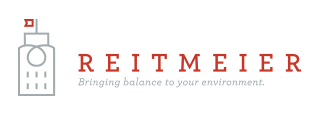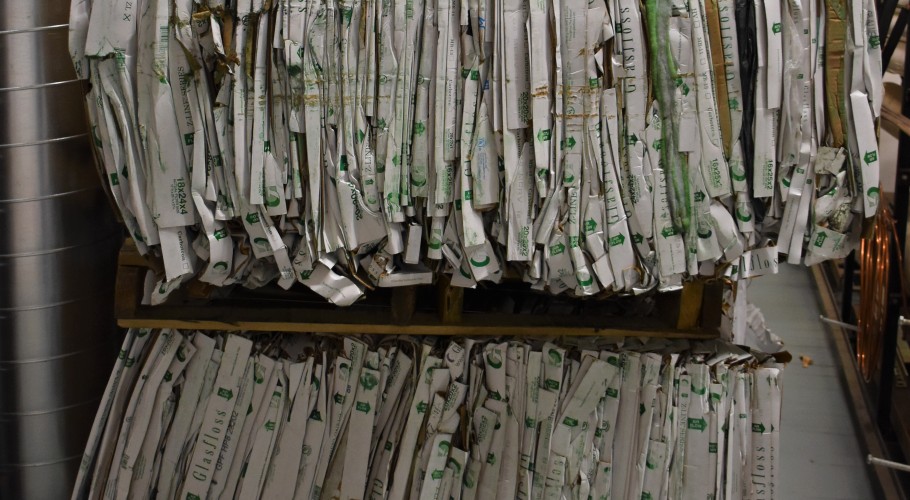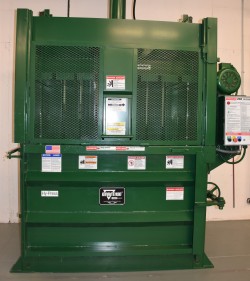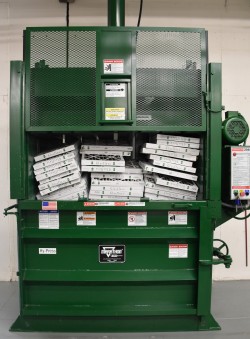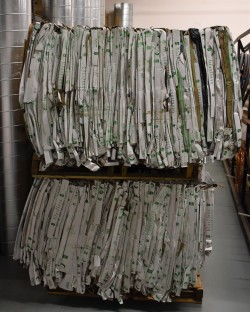In early 2016, Reitmeier embarked upon solving an ambitious challenge: What should we do with all of the used air filters that we remove from our clients’ HVAC systems?
You can read the original post here: Reitmeier is making Zero Waste a Reality: HVAC Air Filters
The environmental impact of air filters
Of course, it’s essential to maintain your commercial HVAC system through quarterly maintenance and tune-ups. This reduces your building’s energy consumption and extends the life of your equipment. Unfortunately, the byproduct of this service is the increased waste created by air filters.
Air filters are comprised of filter media, cardboard, and metal – and while each of these elements typically have their own recycling streams – it isn’t easy to separate these components in a cost-effective manner.
“While air filters benefit building occupants’ health and protect HVAC equipment, we have to replace the old ones with clean ones on a continuous basis,” says Reitmeier CEO Jeff Nusz, “Few people realize the negative impact the used filters have on the environment. When we dispose of these filters in our landfill, it leads to harmful greenhouse gasses and carbon dioxide.”
Keeping HVAC air filters out of landfills
Through strategic partnerships with local, like-minded companies, we solved our air filter challenge. With our new system in place, zero percent of our clients’ filters end up in a landfill or in their on-site dumpster. This furthers our personal goal of becoming a company that produces zero waste.
The best part of our solution? At Reitmeier, it doesn’t cost our clients any additional dollars to prevent air filters from becoming waste – and to have a positive impact on the environment.
Our clients’ HVAC air filters are collected in a central location, picked up by a partner company, and shipped to Covanta’s Energy-from-Waste (EfW) facility located just south of Salem, Oregon. This federally-regulated site burns bulk waste, and in turn, produces high-pressure steam. This steam is then used to power a turbine generator – ultimately sending power back to the grid.
EfW facilities are the only solid waste disposal option with state-of-the-art air pollution control technology, unlike landfills and incinerators which have uncontrolled air pollution. The facilities use advanced air pollution control equipment and emissions monitoring systems that comply with strict state and federal emission standards.
EfW facilities also benefit the environment by reducing greenhouse gas emissions. In fact, Covanta’s facilities reduce emissions by 20 million tons by avoiding methane from decomposing waste in landfills, off-setting fossil fuel electrical production and recovering metals for recycling.
EfW facilities avoid the production of methane – more than 30 times the potency of carbon dioxide – while generating almost 10 times more electricity from each ton of waste compared to landfills. Additional benefits are realized by reducing the carbon emissions from long-haul transportation of trash to distant landfills.
Covanta processes approximately 22 million tons of municipal solid waste each year which conserves over 25 million cubic yards of landfill space and generates 9 million megawatt hours of electricity – enough clean, renewable energy to power for more than one million homes. All of their EfW projects feature state-of-the-art emission control technology.
Interested in learning more for your facility? Start by using Covanta’s Waste Calculator to see how much your organization could send to an EfW facility instead of the landfill.
Taking the air filter solution further
While we are incredibly proud of this accomplishment, one of Reitmeier’s values is to Lead the Way. This means that we are continuously pushing the envelope to see what we can do to innovate and improve.
So, early this year (2019), we purchased a High-Density Baler. This allows us to make fewer trips to the recycling plant (thus saving fuel), reduces the labor needed from our Field Runner, and decreases the space that we need for used air filters in our facility.
The weight of each bale is approximately 520 pounds. The transport truck can take about 8 bales at a time to Covanta – the total weight is about 4,700 pounds.
Thanks for helping us create a better tomorrow
At Reitmeier, we believe the balance between what we consume and what we conserve could very well determine our children’s future. To us, we cannot think of a more compelling motivation for achieving our goal of zero waste.
“We hope that other companies (both inside and outside our industry) will follow in establishing a commitment to zero waste,” Nusz says. “This will create a domino effect toward a healthier environment.”
Through strategic partnerships, creative thinking, and a bit of extra effort, we have taken our HVAC air filter waste challenge even further! We’re grateful to our clients and partners for helping us to create a healthier world for generations to come.
Want to learn more about how Reitmeier leads the way through our air filter recycling? Contact us or call us today at 503-603-0205.
